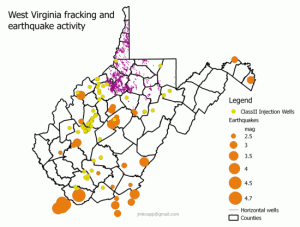From an Article by Kate Mishkin, Charleston Gazette – Mail, May 2, 2019
State and federal regulators are skirting their obligations to protect West Virginia’s drinking water from the effects of fracking, a report from the Natural Resources Defense Council says.
The report, made public this week, examines the way the state Department of Environmental Protection (WV-DEP) regulates oil and gas underground injection activities, and how hydraulic fracturing, or fracking, can threaten underground drinking water if operators aren’t held accountable.
By examining records from the West Virginia Department of Environmental Protection, the group detailed the times the state was inconsistent in its reporting, and found it often sidestepped the state underground injection control program, and federal Safe Drinking Water Act requirements.
In some cases, companies submitted reports that said they’d been injecting wastewater under an expired permit, and that wells had been abandoned without being plugged.
Companies extract natural gas by shooting water, chemicals and sand at a high pressure into wells, often generating large amounts of wastewater, which can contain contaminants such as radiation and heavy metals. Companies often dispose of the large quantities of wastewater by injecting it underground.
And as companies continue to tap into the sprawling Marcellus Shale, the amount of wastewater injected grows, too — “exacerbating the need for safe waste-management practices,” the report says.
“It is crucial that underground injection be properly designed, constructed, operated and maintained — and eventually plugged and abandoned — to ensure that they do not threaten underground sources of drinking water protected by federal and state statutes,” the report says.
In many cases, though, the WV-DEP allowed companies to inject without a permit, continue to operate without applying for a renewal permit before the permit expired and continuing to inject after the WV-DEP issued an order stopping it.
The wells, the report says, “reveal a pattern of unsafe practices and lax enforcement over the years. Any improperly operated well has the potential to cause environmental problems, and potential violations should be taken seriously.”
There are currently three active disposal wells that have received Notices of Violations but haven’t been abated, said Terry Fletcher, a spokesman for the WV-DEP. Of those, two have been abated but aren’t in the department’s database; one well isn’t injecting.
“The WVDEP acknowledges that abandoned and unplugged wells are a legitimate issue and has been working with well operators and others within the industry to find viable solutions to this issue,” Fletcher said.
He said the WV-DEP hasn’t logged any incidents of groundwater contamination from a UIC disposal well.
Amy Mall, senior policy analyst for the NRDC, said some of the failure comes from a lack of accountability.
“I think there’s a combination of the fact that a lot of these sites are in rural areas, companies may think nobody’s watching them [and] nobody’s going to find out if they don’t fully comply with the law,” she said.
And in many cases, companies don’t have a reason to be deterred from breaking rules, Mall said. “Companies don’t have the incentive to comply with the law unless there’s strict enforcement and penalties, otherwise there’s no incentive for them to comply,” she said.
The report recommends the WV-DEP establish stronger operating standards, enforce its rules and be more transparent. It asks the federal Environmental Protection Agency to enforce the Safe Drinking Water Act in the state.


{ 1 comment… read it below or add one }
Some 30 Minutes With Stephen Smith
Democratic West Virginia gubernatorial candidate says it’s time for the Mountain State’s people to ‘demand our fair share’
From Michael M. Barrick, Appalachian Chronicle, June 14, 2019.
Q: As governor, would you require the state agencies – such as the WV-DEP – that are responsible for the health, safety and emergency preparedness of West Virginia, employ the Precautionary Principle?
Smith: “Right now in West Virginia, the relationship between the people, land and the natural gas industry is completely broken. We fundamentally believe in the Precautionary Principle.” Seemingly conceding that he will, at the least, inherit a powerful lobby in the natural gas industry should he be elected, Smith explained, “If we are going to take wealth and resources out of the state, we must ensure that much more of that wealth stays here, and that whatever damage is done is remediated. Neither of those things are happening now. Adhering to the Precautionary Principle is in the interest of the people of the state.”
The Precautionary Principle Defined: The Precautionary Principle, according to the Science & Environmental Health Network, asserts, “When an activity raises threats of harm to human health or the environment, precautionary measures should be taken even if some cause and effect relationships are not fully established scientifically. In this context the proponent of an activity, rather than the public, should bear the burden of proof.”
https://appalachianchronicle.com/2019/06/14/30-minutes-with-stephen-smith/